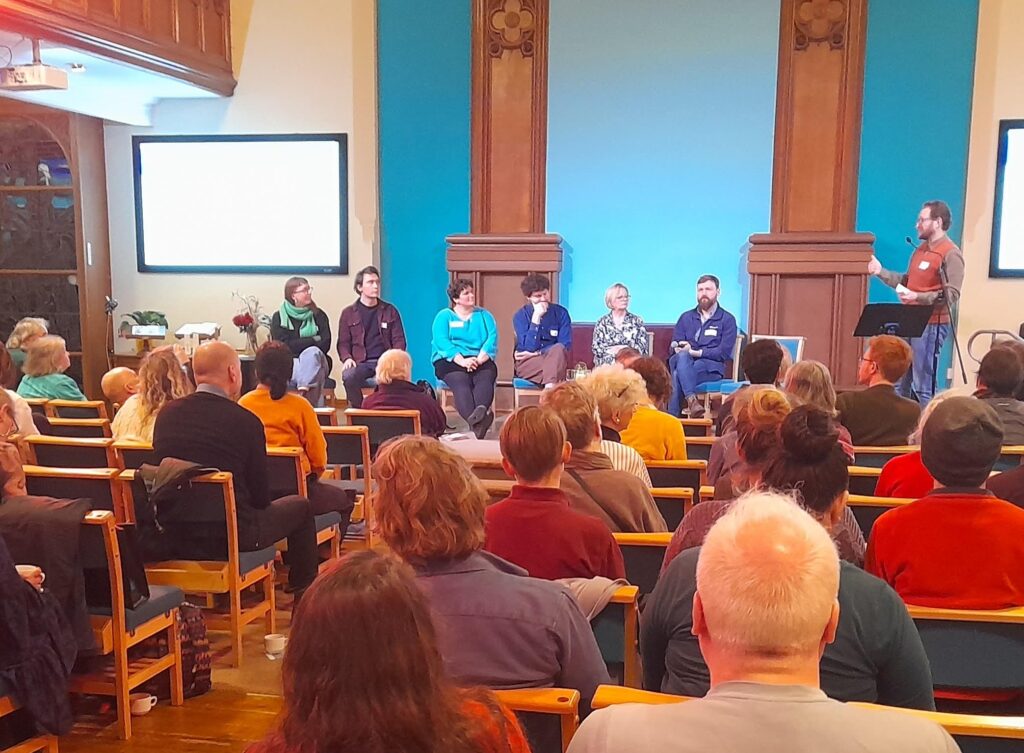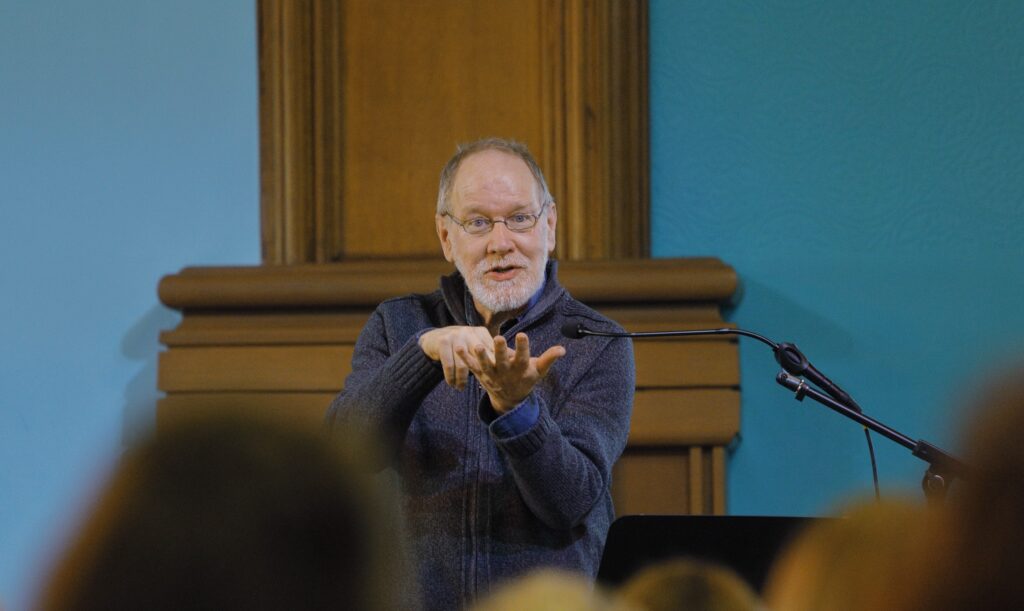SCCAN Story Weaver Lesley Anne Rose reflects on the launch of Edinburgh Communities Climate Action Network (ECCAN) on 27 March 2024 at the Augustine United Church in Edinburgh.
“The event got ECCAN off to a good start.”Participant feedback
It was a cold, wet day in Edinburgh. The kind of spring day that feels closer to winter than the promise of summer and you have to dig deep to believe that things are going to get better. The launch of Edinburgh Communities Climate Action Network (ECCAN) was a day that held all of that promise along with inspirational stories of work around climate action already in full swing and much more.
There is always a sense of peace at Edinburgh’s Augustine United Church where the launch was being hosted. Its main Sanctuary is a space that encourages you to be present and reminds you when tackling difficult topics that underlying all of the debate and calls for action is the common goal of caring and wanting to make the world a better place.
It was almost a year to the day since Scottish Communities Climate Action Network (SCCAN) held their 2023 annual gathering in the same space. One of the outputs the Scottish Government funded SCCAN to achieve was to set up Scotland wide community Climate Action Networks. These networks are tasked with supporting the development of Climate Action Hubs with the aim of establishing a strategic regional approach to climate action. It was heartening to be back in the Sanctuary for the launch of ECCAN as the Climate Action Hub for Edinburgh and to find out more about its plans.
Ben Carter, one of ECCAN’s Trustees opened the day and hosted it throughout. ECCAN has already become a SCIO and recruited Trustees and staff, and Ben welcomed Dr Carole Kelly, ECCAN Convener to kick off the day with an update on further progress and next steps.
Opening Presentation: Dr Carole Kelly, ECCAN Convener
Carole shared that one of the main drivers of ECCAN is to make it easier to take climate action and for those that do to be supported. How the Hub works and its activities will be shaped by local communities and members, with the action to build capacity and connections high on the agenda. All of which could include business climate resources, knowledge exchanges, skills development, funding, networking and training events as well as exchange visits. Those working on a climate related project can often feel isolated and Carole was keen to acknowledge the importance of connection, networking and support that ECCAN offers. Carole concluded by reminding us that Edinburgh already sits in the highest category of a city taking climate action, highlighting especially active travel and cycle infrastructure alongside more community driven activities such as buying pre loved clothes by the kilo at Out of the Blue to the distribution of food destined for landfill through FareShare.

Scottish Government Overview: Louisa Harvey, Community Climate Action Team Leader
Following Carole’s overview of ECCAN, Louisa Harvey, Community Climate Action Team Leader at the Scottish Government, who leads on the climate action hub programme, spoke of its background and intentions. She detailed that underpinning the programme is a Public Engagement Strategy that aligns with the government’s goal of reaching net zero by 2045. Community engagement with tangible on the ground projects that people can get involved with is a part of this wider strategy and opens up two way communication between policy and communities.
The Climate Hubs are all about supporting local climate action and enabling more people to get involved and drive climate action through events, training, networking, seed funding, building resources and enabling collaboration. Louisa talked of the growth of the network from two pathfinder hubs (NESCAN and the Highlands and Islands Climate Hub) to a total of 20 across Scotland of which ECCAN is one.
The aims of the Climate Hubs are to:
· Raise awareness and widen participation
· Empower communities to develop local solutions
· Allow an approach that reflects local circumstance and priorities
· Build local partnerships and collaborations
· Provide a voice to communities supporting our Just Transition
Evaluation has proved that Climate Hubs have been an impactful way of using resources and making a difference with shifts evident from empowerment and proactive participation, to funding from local authorities. The focus now is to secure more funding for the Hubs and communities. In addition to the community action already taking place, the aim is that this funding will also support the development of local resilience plans and ensure climate solutions are embedded in local planning. This will include aiming to establish multi year funding to ensure more stability, regional collaboration between the hubs, widening participation and developing projects at scale.

ECCAN Members Showcase
ECCAN already has over 70 members and the Members Showcase that lead the day to lunch shared tangible examples of community climate work in action and the difference it makes.
Edinburgh Building Retrofit and Improvement Collective
The Edinburgh Building and Improvement Collective is an initiative that supports the development of resilient communities through community led improvement of buildings. Their work covers free impartial hand holding and advice on retrofitting as well as supporting home owners to make it more cost effective by bringing people together to form groups in order to make materials cheaper through buying in bulk and sharing decision making.
Cargo Bike Movement
Operating under the mantra of:
If You can’t see it. You can’t be it
Edinburgh’s Cargo Bike Movement is a charity set up during lockdown in response to food insecurity and brings together cargo bikes and around 50 volunteers offering a collection service for surplus food to community food banks, shelters and hostels. The movement is all about cargo bikes and spreading the word on how good they are and the positive contribution they make towards greener, cleaner and healthier cities and communities. Road safety and cost are the biggest barriers to people investing in cargo bikes. To address these, the Cargo Bike Movement offer training and opportunities of shared ownership. They’ve been so effective at spreading the word that both a plumber and handyman in Edinburgh are using cargo bikes as utility vehicles for their work.
Edinburgh Remakery
With the aim of cultivating a culture of repair and reuse, the Edinburgh Remakery is a social enterprise and charity committed to making things last longer through repair. To highlight one of the initiatives Edinburgh Remakery has undertaken, Barbara Hamilton their Fundraising and Partnerships Manager, shared details of their tech donation boxes in schools. E waste is one of the world’s biggest polluter, and the aim of their tech boxes was to engage young people that simple things that can done around repair and refurbishment before re-cycling. Five tech boxes were initially taken into 15 schools throughout Edinburgh stimulating courageous conversations around tech and the idea that if everyone does a little, no one needs to do a lot. The project saved half a ton (the equivalent in weight of two highland cows) worth of e waste from landfill and exposed 17,000 pupils to the tech donation boxes and conversations around waste. From this project saved and repaired devises were donated to people who experience digital poverty.
Porty Community Energy
To reduce the amount of carbon we produce, both as individuals and as a community.
Porty Community Energy Mantra
Low carbon heating and transport are the two main areas that Porty Community Energy is looking to address and support. Underlying both is the aim having fun so people want to join in and take part in community climate action. Even though everything they do is practical such as bike storage and the loaning of comfortable saddles, it’s linked to bigger picture conversations. They are also part of a wider group led by Transition Edinburgh that’s thinking strategically about heat decarbonisation.
Rhyze Mushrooms
Rhyze Mushrooms Co-op turn trash into food at Edinburgh’s Community Mushroom Farm. Here they use urban waste destined for landfill such as sawdust, coffee chaff and spent brewer’s grain to grown mushrooms inside a converted 40ft shipping container. Under the banner of ‘accessible alchemy’ they also provide training workshops and boxes with everything you need to start growing your own mushrooms at home. As well as working with community groups to encourage growing mushrooms in outdoor disused spaces.
We Spoke Hub by Shurb Coop
The Wee Spoke Hub are an Edinburgh Bike Coop with a difference. They believe that the more you know about your bike, the more likely you are to use it. They’ve created a quiet, safe and diverse workshop space through which they offer bike repair courses equipping people with the skills to repair and maintain their own bikes. All with the aim of making cycling more accessible to people from all walks of life.
Lauriston Agroecology Farm
Lauriston Farm is a 100 acre piece of land in North West Edinburgh, overlooking the Firth Of Forth, and has a long history of food production. However, in recent years the land was solely being used for intermittent grazing and silage production. The Edinburgh Agroecology Co–operative are proof of what can be achieved with a shared vision and community, and are transforming Lauriston back into a large scale food growing farm which is nature and community rich with a focus on increased biodiversity, food production using regenerative farming practices and community learning and growing. They believe that food is a gateway to encouraging people in and is a powerful way to empower people to believe that life can be better. Like many community projects they are supported by countless volunteer hours and one of the many initiatives they undertake is Fresh Start – a new home pack to support people moving on from being homeless.
The members showcase was an inspiring collection of stories of people, communities and organisations who are making a difference. The discussion that led into lunch explored some of the challenges and raised the question – what’s needed? The bulk of the points raised talked of funding from not enough to long term support including core costs rather than project funding. Within this the recognition of the importance of maintaining a culture of collaboration and diversity, not competition.

Active Hope
Following a networking lunch with locally produced food provided by Edinburgh Food Social Chris Johnston led us through a session of Active Hope.
It’s hard to hope, but not so hard to have hopes.
Active Hope isn’t about being hopeful, but about working out, and being clear, what you hope for so that hope and action can come together. It’s a method of creating resilience – personal and collective – in the face of the overwhelming ‘mess we’re in.’
It’s a philosophy, a wellbeing practice and a statement of meeting big with small. Big problems with small actions. Active Hope provides techniques that enable us to keep going when energy and funding run low – or as Chris described ‘the loss of top soil’. But more importantly it reminds us that stories happen through us and the actions we take. As such each of us, through our everyday actions, has the power to write the story of the future we want for the world and in doing so turn towards a life sustaining society.
Story is something that can happen through me – not just to me.
Chris shared tips and techniques from encouraging us to pay attention to what is happening in the world, to holding in the palm our hand what we feel overwhelmed by. All the while encouraging a sense of radical uncertainty.
Chris encouraged us to work in pairs asking each other the question:
Something I would like to do as a way of playing my part is?
And encouraged us to move away from ‘I can’t’ to ‘We can.”
He also introduced us to the College of Wellbeing and their online training for resilience and wellbeing.
The day concluded with a number of workshops to choose from. I chose to join the Climate Café – a reflective space where through silence and discussion a small group of us came together to conclude the day by sharing how we were feeling and what had emerged for us from the day. We were each offered a tray of objects and invited to pick one that resonated with us and what we were feeling. I picked up a sprig of fresh rosemary because it’s a herb that stimulates our memories. Some aspects of climate action taking place at a community level is a remembrance of the past and repurposing it for a better future. My parents and grandparents grew up with re-purposing and repairing, of cycling over driving and home grown food. It’s also believed that the ancient Greeks placed sprigs of rosemary beneath their pillows at night to help them dream more clearly. All of which chimed for me about the day. However, the launch of ECCAN wasn’t only about laying out a clear vision for the future of community climate action in Edinburgh, it was also a day of demonstrating the huge amount of work already being undertaken to make this dream a reality.
For any queries, please email edinburgh@eccan.scot

